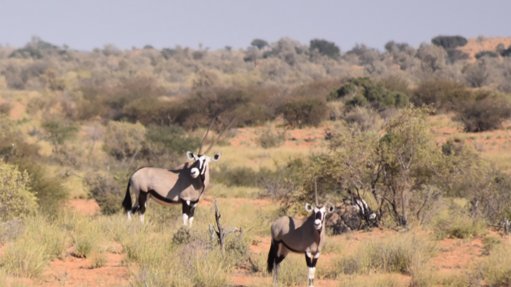
With more than 30 mines operating in the southern Kalahari, the upcoming Restore Kalahari symposium, on March 17, will investigate how the region can be transformed into a leading restoration area within the context of industry trends, Kalahari research and recent legislation promulgated to effect this vision.
The event, which will be held at the Namakwari Lodge in Kathu, in the Northern Cape, will seek to connect mining, solar, agricultural, engineering and environmental managers, as well as scientists.
From the 1950s, profitable mining has led to tremendous expansion and development in the southern Kalahari. The Kalahari has seen significant change as a result of cumulative mining over many generations, which has been exacerbated by growing urban populations and, more recently, solar energy projects.
Rehabilitation efforts in the Kalahari started during the 1980s. To satisfy mine closure obligations, rehabilitation expenses are increasing and the law is evolving and becoming more demanding, which calls for a deeper knowledge.
Rehabilitating mining properties in the Kalahari region is challenging owing to the region's semi-arid climate, which makes it difficult to restore vegetation and stabilise the soil.
Further, mining activities typically result in the removal of topsoil, which is rich in microbes, organic matter and nutrients, making it challenging to restore the soil’s fertility. It may take years or even decades to fully restore ecosystems.
“Many of these mines have the same challenges. In addition, the Kalahari is also now a quickly expanding solar plant area. We also have a significant history of asbestos mining in the region, which was not resolved properly, resulting in gaps in restoration,” environmental services company Endemic Vision Chrizette Neethling tells Mining Weekly.
Arid areas, such as the Kalahari, consist of complex interactions, providing significant challenges to define a workable system that can be used for rehabilitation success.
“Everybody is trying to restore their areas as best as they can on very tight budgets and trying to comply with very tight timelines. Companies are doing trials without speaking to each other, and so there is duplication in work,” she explained.
Although the mining and construction sectors in the Kalahari have access to a sizable amount of resources to solve these issues, isolated initiatives need to be coordinated, knowledge needs to be shared and resources need to be used wisely to produce sustainable land uses after mining.
The seminar's goal is to bring together Kalahari business leaders for an exchange of rehabilitation-related solutions. It is geared at Kalahari leaders and service providers who wish to grasp and address the region's closure and rehabilitation concerns.
“We have speakers talking about elements of restoration that we may not always think of and to include that in the full picture. It’s not just about the planting of vegetation on the waste dumps, which everyone focuses on.
“For example, we will have a specialist talk to us about the Kalahari groundwater, which is very important,” Neethling says.
The event has presenters and sponsors from the Minerals Council South Africa, the Land Rehabilitation Society of Southern Africa, the North West University, Endemic Vision and Luhlaza.
Neethling hopes industry players and stakeholders will use the event as an opportunity to network and to find common solutions to accelerate restoration in the Kalahari.